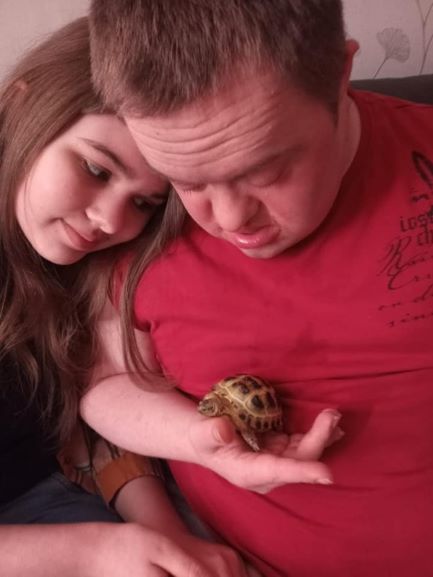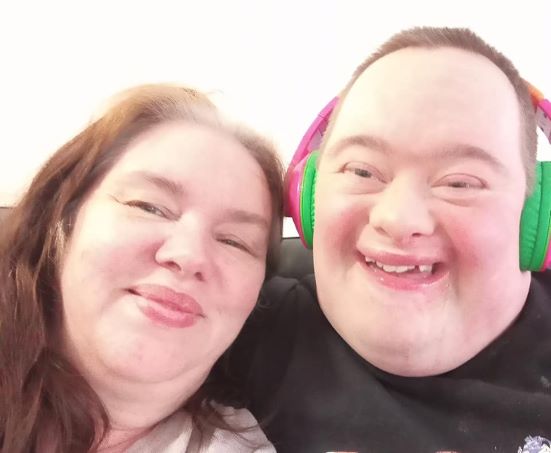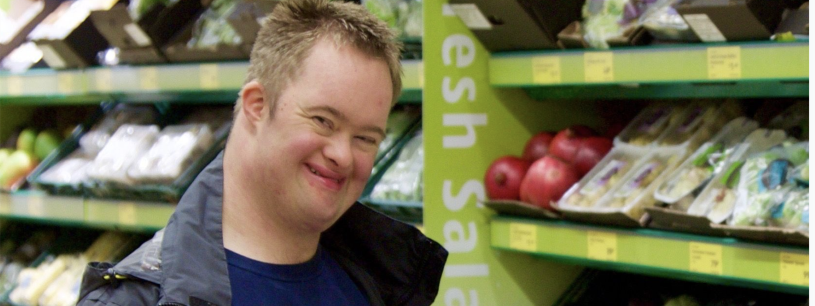“David is just a person like anyone else. If you take out the Down’s Syndrome, then he is no different to anyone else.”
Elizabeth, David’s sister
David has lived in his own home now for six years and enjoys a lifestyle enriched with experiences, thanks to the creativity and flexibility of his care. In his updated Ordinary Life Book, David and his mom, Helen, share the advantages, as well as the potential drawbacks, of having a direct payment, and foreground the importance of taking a person-centered approach to care and support, where individuals with disabilities are encouraged ‘to live, not exist’.
David talks about his life – My Life
My name is David. For the last 6 years I have been living in my own home and loving it.
This book tells you about my life, my strong sense of independence and some of the
challenges I face and how I overcome them.
A bit about me as a person – I am my own man! I know what I like and what I don’t like, and I am confident communicating this to other people. I am very much a people person. I am friendly,
outgoing, fun-loving, and have a wicked sense of humour. I definitely have a cheeky streak!
If there is something I should not do, I will do it and then smile to myself or have a chuckle. I can’t resist!
“David is a pleasure to work with.
He’s very mischievous; he doesn’t miss a trick. He really keeps me on my toes and entertains us all.”
Lynne, one of David’s staff team

Living in my own home
I have now been living in my own home for 6 years. In the first year, it took me a while to
understand that this was my own home, as I had lived in residential homes before. I did not
have as much choice and control in residential homes, as I do now.
“David is a lot happier now he lives in his own home. He does more with his life and he’s got a lot more choice. I get to see my brother a lot more because he’s got his own home and we are a lot closer because we spend time together.
I remember when he was in the residential home he was angry. He’s not angry anymore, just mischievous and always planning something.”
Elizabeth, David’s sister

“David has more freedom to do what he wants because it’s his own home. In the residential homes he lived in, it was very controlled. It is much better for him and for his family having his own home.”
Helen, David’s mom
Staff support me to live independently in my own home. I am supported to do my house work.
I don’t like doing housework, it’s boring but I know I have to do it. I clean really thoroughly
once I get started but still don’t like the actual word ‘cleaning’.
I am supported to cook all of my own meals, except for when mom cooks a Sunday roast.
“David loves a cup of gravy with his Sunday roast, whether we are at home or in a restaurant.”
Helen, David’s mom
Making my own choices in my own home
I like to make my own choices and I’m in control of my life each day. I know what I like and
what I don’t like. I take risks in my life and I like to learn and try new things.
Until I lived in my own home, some things were ‘kept away’ from me. Staff in the residential
home said they had to lock things away from me. At Christmas I always used to post the
Christmas decorations. This means I took them off the tree and posted them down the back
of the radiator or other places. Now I am in my own home, this doesn’t happen. My tree stays
up for the whole of Christmas from 1st December to Boxing day. This is a real achievement
for me.
Sometimes I will still ‘post’ things as it can be a lot of fun, but not as often as I used to. I might
put things down the radiator or out of the window. Sometimes it’s also fun to throw things over
the fence and see what staff do.
“David still posts things as he finds it really amusing. He’s got a really mischievous streak. Sometimes he will plan all day how he’s going to trick a staff member as he knows it will get a rise out of them. When David was in the residential home he was posting things because he was angry and sad, now he posts things in a cheeky way to get a reaction out of staff. He will look at you, and the look on his face says
‘look what I got away with!’ This really keeps staff on their toes. If David has fun in this way it also stops things escalating.
In his own home, it is safe for David to express himself and some of the things he does like posting items and being mischievous are ways David communicates. It’s when he is not mischievous that I start to worry. Being mischievous is not just fun to David, it’s a coping mechanism. He does not like being bored and likes to make his own fun.”
Helen, David’s mom



0 Comments